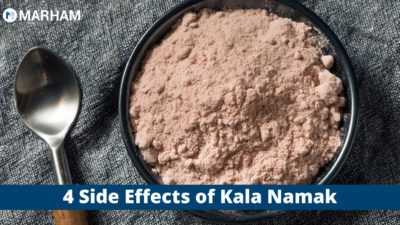Black salt or Kala namak is commonly used in Pakistani households. Shop keepers usually give it away as a complimentary treat to enjoy with fruits like oranges or guavas. While it adds extra flavor to your food and makes it more appealing, there are some black salt side effects you should know as well. Let’s discuss the qualities, uses, and black salt side effects in this article.
Black Salt vs. White Salt: Sodium Content


Black salt is a mixture of sodium chloride, sodium sulfate, sodium bisulfate, and ferric sulfate. And might contain some impurities as well. It has a mildly pungent odor as well as a slightly sour and salty taste. Black salt is most commonly used to season both cooked and raw foods. You can also read more about the benefits of black salt for health here.
Black Salt Sodium Content: 1909 mg in one teaspoon (5g)
White salt, table salt, or regular salt is a common ingredient in cooking and food preservation. Unlike black salt, it is impurity-free sodium chloride. It has a salty flavor and no odor. However, it is highly refined and processed.
White Salt Sodium Content: 2373 mg in one teaspoon (5g)
Doctors recommend taking less than 6 grams of salt per day, as a higher sodium intake can lead to some of the health issues discussed below.
4 Black Salt Side Effects
Even though black salt has lesser sodium content than white salt, it can still lead to health issues when taken in large doses. Some of the black salt side effects include:
1. Dental Problems
Black salt may cause fluoride toxicity in the body because some brands add fluoride to their black salt products. While fluoride is essential for your bone and teeth health, some researchers suggest otherwise. According to Fluoride Action Network, black salt might cause dental fluorosis problems. The reason is alterations in tooth enamel caused by high fluoride ingestion. So, in particular, children should limit their black salt intake to encourage normal teeth enamel production.
2. Kidney Stones
If you have a diet high in sodium, you might be at risk of kidney stone development. It is also one of the black salt side effects because excessive intake causes high sodium levels in the body. And that causes the kidneys to form stones. Therefore, if black salt is lower in sodium than regular salt, it does not mean you can take it in large amounts. Read more about the types of kidney stones in Pakistan.


3. Thyroid Disease
You must have seen the label of Iodized Salt on your white salt packets. It means the mineral iodine is added to salt during manufacturing to avoid its deficiency. Iodine is an essential mineral, and its low levels in your body can cause thyroid problems like hypothyroidism. So, another one of black salt side effects is that it does not have iodine. It has to be added to your diet through other food sources. Otherwise, you’ll be at risk of developing thyroid problems. Patients with thyroid disease can consult online or book an appointment with the Best Thyroid Specialists in Pakistan through Marham.
4. High Blood Pressure
Black salt is harmful to people with high blood pressure or heart disease. The reason is that even though in lower amounts, Kala namak still contains sodium content. And it has been linked to increased blood pressure levels. Therefore, heart patients or those who regularly have high blood pressure should not take more than one teaspoon of black salt in a day. Learn more about controlling your blood pressure at home.


Some other Side Effects of High Sodium Intake
Sodium is a mineral found in many foods we consume, processed and packaged foods have relatively higher quantities of sodium. Consuming more than the required amount of sodium can cause the following side effects:
- Cardiovascular diseases
- Irregular heartbeats
- Blurred vision and dizziness
- Nosebleeds
- Nervous system suppression
- Excessive sweating
- Epileptic seizures
- Stomach ulcers
- Strokes
- Inflammation
Recommended Sodium Intake
According to U.S Food and Drug Administration (FDA), the recommended amount of sodium is less than 2300 mg per day for adults. While children under 14 are advised to consume even less than adults. It means you should be taking less than 1 tsp. Salt of any kind every day.
The Bottom Line
Black salt is known to add a distinct taste to the food that increases its appeal. It is commonly found in our kitchens in Pakistan and is usually sprinkled on fruit salads or chaats. It is true that it provides a lot of benefits, but at the same time, there are some black salt side effects as well. You must have a look at them before the next time you use Kala namak. Lastly, make sure to get regular health checkups if you have any of the health problems caused by black salt side effects.
Book an appointment now, to answer all your queries. You can book an appointment with the Top Doctors in Pakistan through Marham by calling at Marham helpline: 0311-1222398 or by online booking facility through the website or Marham mobile app.
Can’t Find The App?
Android Users:
https://play.google.com/store/apps/details?id=controllers.marham.marhammed&hl=en
Drop a review for us at Playstore if you’ve had a good experience!
iPhone Users:
https://apps.apple.com/pk/app/marham-find-a-doctor/id1095243102
FAQs
1. Is black salt bad for kidney?
Increased intake of black salt in the diet can lead to the development of kidney stones over time.
2. Does black salt cause weight gain?
No, black salt does not lead to weight gain.
3. Is black salt good for BP?
When you take high amounts of black salt (more than 1 tsp/day) it may lead to the problem of high blood pressure.

